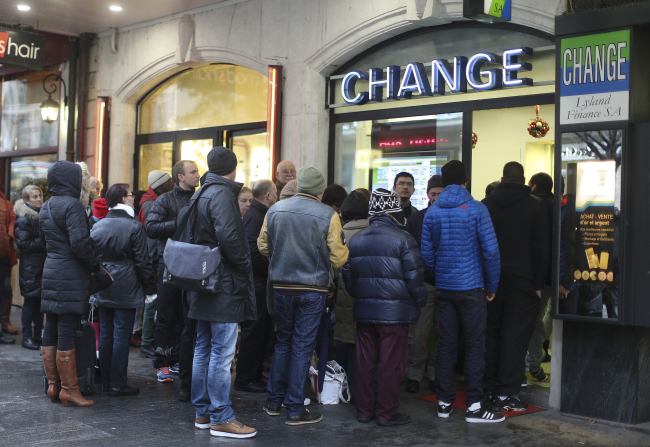GENEVA (AFP) ― An overheated Swiss franc could have “dramatic” consequences for the country’s economy, a top official said Sunday, as the country’s business and tourism sectors braced for tumbling sales.
The franc has jumped around 15 percent against the euro since the Swiss central bank stunned markets Thursday with its bombshell decision to abandon the minimum rate of 1.20 francs against the European common currency.
The Swiss National Bank had since September 2011 been defending the exchange rate floor in a bid to protect the country’s vital export industry, including by buying massive quantities of foreign currencies.
If the franc remains at its current level, trading at around parity with the euro, “the consequences will be dramatic,” Serge Gaillard, head of the Swiss Federal Finance Administration, told the Zentralschweiz am Sonntag weekly.
He warned that the economic outlook for the wealthy nation would “radically” worsen, although he said it did not believe it would slide into recession.

Customers wait in line to exchange their euros for Swiss francs outside a bureau de change currency store in Geneva, Switzerland, Friday. (Bloomberg)
The high level of the franc is seen as a significant threat to Switzerland’s export-dependent economy, as prices for Swiss goods abroad suddenly jumped 20 percent overnight.
The central bank has faced a barrage of criticism, with Swiss exporters and tourism companies accusing it of sinking their business.
Thursday’s move has also been criticized abroad, where the soaring franc has wreaked havoc on markets, engulfed eastern European neighbors whose mortgage debt is denominated in the franc, and bankrupted at least two foreign exchange brokers.
Central bank chief Thomas Jordan has adamantly defended the move, insisting the bank’s efforts to hold down the Swiss currency, including through buying up massive amounts of foreign currency, were no longer justified.
He has received backing from Swiss Finance Minister Eveline Widmer-Schlumpf.
“I do not question the move,” she told several Swiss media in an interview published Sunday, voicing confidence that “Swiss businesses will handle the situation.”
She said it was “too early” to envisage business tax cuts to counter the effect of the strong currency, but said she might reconsider further down the line.
Swiss businesses were meanwhile bracing to see exports plunge and shoppers at home flood across to neighboring eurozone countries for cheaper goods.
“Overall, our country has landed in a much more difficult situation,” Heinz Karrer, head of the Swiss Business Federation, told the Sonntagszeitung weekly.
“If the exchange rate stands at around parity, many Swiss export companies to will likely no longer be able to compete,” he warned.
The country’s already struggling tourism sector meanwhile began seeing cancellations as already pricy ski resorts suddenly became far more expensive for foreign visitors. “We are still in shock,” Juerg Schmid, head of Swiss Tourism, told the weekly Le Matin Dimanche, lamenting that the “brutal” central bank decision had “created uncertainty ... on the eve of the high season.”
“The telephones have stopped ringing, and ... online reservations have stopped,” he said, adding that the industry now needed to try to persuade Swiss tourists who already have francs in their pockets to stay in Switzerland this season.
That could be complicated. Armed with more purchasing power abroad, many shoppers were already heading across the border to snap up cheaper goods in neighboring eurozone countries.
“When you look at the prices here, you realize it really, I mean really, pays off,” Daniel, who lives in Switzerland, told Le Matin Dimanche as he pushed a cart around a French supermarket.
Geneva-based homemaker Ana Cecilia meanwhile told the paper she planned to do much more shopping in France, estimating that she could save some 400 francs(euros) a month at the new exchange rate.



![[Weekender] How DDP emerged as an icon of Seoul](http://res.heraldm.com/phpwas/restmb_idxmake.php?idx=645&simg=/content/image/2024/04/25/20240425050915_0.jpg&u=)


